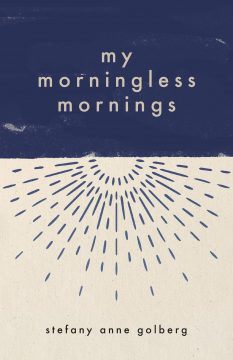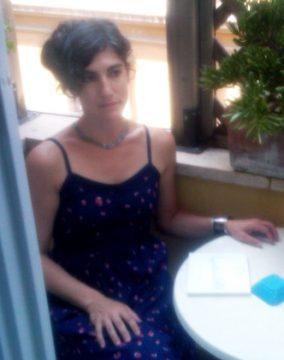by Zara Houshmand
 Stefany Anne Golberg’s My Morningless Mornings is one of the most unusual books I’ve ever encountered. It’s very quietly ambitious, framing its aspirations without obvious fanfare, and it accomplishes them with rare elegance and efficiency.
Stefany Anne Golberg’s My Morningless Mornings is one of the most unusual books I’ve ever encountered. It’s very quietly ambitious, framing its aspirations without obvious fanfare, and it accomplishes them with rare elegance and efficiency.
Ostensibly the book is a memoir, but just barely. Its narrative scaffolding consists of memories from a period of Golberg’s life when, as a young teenager, she kept a nightly vigil in her suburban Las Vegas home while her father descended into mental illness. The rest of her immediate family had jumped ship. Staying awake every night until dawn and then sleeping from dawn until noon, she evaded the morning—a time fraught with anxiety and the burdens of reality. The night time hours were filled with the drone of old films and documentaries on television and with stacks of library books and encyclopedias that fed her self-directed education.
That narrative scaffolding is constructed with exquisite finesse and reserve, without the faintest hint of melodrama. The things unsaid—the absences—are as powerful as what is revealed. Consider this passage:
From the window I could also see the evergreen trees that had been planted in front of my house when I was one year old. They had become sick and thin, following the rest of the backyard, making it easier for the sun to reach the anguished message my father had scrawled in giant block letters on the driveway earlier that spring.
What were they, the trees? Junipers, I think. They had round, pale fruits that tasted like rocks and were the color of a northern sea, the color of water Jules Verne must have sailed across in his little wooden skiff, the color of Jacques Cousteau’s eyes when he gazed across the bow, just before diving down deep. Maybe this is the fear we all share. That when the morning comes, and shines its light, we will have to read the message that has been put there before us. Or worse, that there will be so much sunlight and nothing at all to see.
That single image of the message written on the driveway is the totality of the story, one of a small handful of carefully placed details where the constant background tension of her father’s decline breaks through the surface. But in the voids created by that minimalist narrative, another world emerges. Here the mention of Jules Verne and Jacques Cousteau looks back to a passage earlier in the book, that launches from Cousteau’s late night television documentaries, and how Verne’s imaginary expeditions inspired his career, into the fathomless, sunless, undersea world as an expression of shadow work, and Verne’s fantastic vehicles as fully contained interior spaces where “a ship is a symbol for the perfection of one’s inner humanity.”
These chains of reflection crisscross through the book, weaving together themes of darkness and light, sleeping and waking, and the transitional regions of dawn’s twilight and the dream world.
One strand exploring the tension between darkness and light starts from the liminal space of Golberg’s vigil between the glow of the Las Vegas Strip and the high desert starlight, and proceeds on a tour, first to the studio of a light artist working as “a Doctor Frankenstein in neon,” then to the shadowy elegance of the novelist Jun’ichiro Tanazaki’s dimly lit rooms, and from there to Fildes’ painting The Doctor, where the competing light sources, natural and artificial, make meaning out of composition: “The glass lamp is the stolen light of Prometheus, the light of reason and Edison and willpower and casinos. The window is the light that belongs to the gods. It is the light we can’t control and can’t steal.” And finally she caps this by noting that Thomas Edison also rarely slept at night.
What seems at first like free association becomes a tour de force where imagination leaps over strange distances and resolves into unpredictable insights. It is this wandering spotlight and its sudden revelations, as much as the lyrical precision of the language, that makes the book feel like an extended prose poem. All this eclectic wonderment is far more effective than any sampling can hint at, but let me offer one more example.
After the time of nightly vigil has ended, Golberg leaves Las Vegas, driving vaguely towards New York City, and sleeping at night on the roadside. There is no more avoiding the morning. But between the moment of awakening at dawn, lying in the weeds under the startling gaze of a lynx, and a truck stop breakfast a little later, she leads us on a remarkable detour: to Marina Tsvetaeva on the black at the center of an eye—“a blackness that sucks at light,” to Plutarch and why early naturalists believed that the lynx can see through rocks and trees, to daybreak as “the rupture of Creation reiterating itself,” and to the powerful radiance of dawn light on two tiny human figures in Caspar David Friedrich’s painting Rock Arch in the Uttewalder Grund, who “stand helpless and amazed and small before the threat of being utterly crushed.” And on to breakfast, where the morning light greets truckers hunched over waffles on the edge of a nowhere town waking up to turn on televisions and pick up newspapers from front lawns. Once faced, the morning is simultaneously mundane, terrifying, and pregnant with an ordinary glory. It all depends on the gaze.
This is not just intellectual showmanship, though it may seem so in these summaries. It is the careful weaving of a translucent fabric, a veil that makes it possible to look directly into the light. These wanderings don’t do anything as assertive as constructing an argument. They merely observe, tracking the path of an embracing and wide open curiosity until it becomes clear that the gaze itself—the nature of awareness refracted through this particular mind—is the subject.
***
When our esteemed editor Abbas Raza first invited me to write about My Morningless Mornings, he suggested that I interview the author. It seemed an easy task: a conversation, a transcript, a bit of editing, and presto: a written piece! The chance to connect with Stefany personally, however virtually, was intriguing, if a little scary to someone as introverted as I am. Surely the structure of an interview would make it easier. (I will call her Stefany now that this becomes an encounter with a real human being instead of the figure of an author.)
But on reading the book, the assignment seemed much more daunting.
I imagine that, for a reader, the purpose of interviewing an author is to lift the curtain or poke around in the projection room. It assumes that the author has something to say about the book that didn’t make it into the book. Given the glancing delicacy with which she handles her family story, the significant voids and the lace she has woven around absence, I felt that any probing for more context would seem vulgar and voyeuristic. Perhaps I should frame it, writer to writer, as shoptalk about craft? But a kind of voyeurism attends it regardless. “Tell us how you do that magic trick” is less about technique, more about probing the mystery—or even just acknowledging the mystery: How is it that you have planted your world in mine and made it come alive on alien turf?
For all my doubts about the exercise, Stefany was gracious beyond imagining. We spoke in February, before the book was published. Here are some excerpts from our conversation, edited for clarity.

Zara:
A lot of what you’re drawing on in terms of your reflections comes from art and philosophy and anthropology. You don’t touch much on literary sources. I’m interested what gave you the notion that this was a possible way to write a book? Did it develop as a fully blown vision or did you stumble on it accidentally through process? How did it come to be the book that it is?

Stefany:
I don’t know. I mean, I can tell you that I did not have a big plan when I started writing this book. I wanted to write another book. I was trying to write another book and it just wasn’t going anywhere.
Zara:
What was that other book?
Stefany:
It was a book about Poland—a trip to Poland that my husband and I took in 2009. And this book just really kind of came out of nowhere for me. For about a year or two, I found myself just writing about the morning and I thought, Oh, it’s very interesting for me to write about the morning, using different paintings that I like and reflecting on television shows. And at a certain point I really realized somewhat to my horror that something was not feeling very satisfying or authentic about what I was writing. Because what I really wanted to try to get at was not so much different ideas about morning, but the real experience of it. And when I thought about that, I realized that I was really going to have to look at my own experience of morning. And then going out from there, I realized even more that my experience of the morning was very deeply tied to this particular period of my life, when I was a teenager that I write about in the book. This is all a way of saying that I feel a little bit like this book was and is somewhat bigger than me, and that the plans that I had for it were somewhat derailed.
…
Zara:
My own experience in writing is that voice is a key. I think of voice in some ways as a mask that frees you to write from behind it, but in other ways it can be revealing and transparent. I was looking at some of your earlier stories online and I was struck by the consistency of your voice over time.
Stefany:
I’ve been writing since I was a little kid and I think that any person who writes for a really long time and consistently is looking to figure out how words go together in just the specific way to try to communicate what you want. And yet at the same time, of course, it’s true that it’s never—I don’t know, maybe this is the mask that you’re talking about—it’s never quite satisfying if what you want to do is to communicate your own heart. It’s interesting because when you started to say, “Oh, and I looked at some of your earlier stuff,” of course I thought that you might say, “and it’s completely different.” It was really interesting that you said it’s not. Sometimes it takes somebody else looking at it. Maybe it’s just the result of writing in a certain way for a long time and figuring out the song in my head, if that makes any sense.
Zara:
Totally makes sense. The question in my mind is coming from my own experience writing for theater and also ghost writing where I very consciously cultivated another person’s voice to write through. So it seems incredibly brave to me to develop your own voice in that way.
Stefany:
Funny that you say that. I have a little theater background myself. I originally went to New York to study theater and acting. When I was a teenager at this particular time that I was writing about, I was also doing Las Vegas community theater and I was pretty excited about the idea that I could be other people. Maybe it’s all a mask. Even my attempts to try to write as authentically myself as possible, that’s the self that I am today and maybe have been for a few years, but probably if you were to read something that I wrote when I was in my early twenties, it would be completely different. And maybe twenty years from now if I’m still writing and living, it might be different too. Maybe this is where I’m at right now.
Zara:
Given the process of writing this book and the unforeseen nature of it, I’m curious how it changed you and how what you do next might be different because of this.
Stefany:
Oh man, these are really good questions. I think it’s still continuing to change me. Because this book has not been published yet, somehow I feel that the act of publishing it will continue to transform even what it means for me. I don’t know how to give a good answer to this question. Writing this book was really hard. It kind of ripped my soul apart to be perfectly frank and I suppose I don’t even really know how it changed me or how it will continue to change me. It definitely broke something open for me as a writer. I’ve been kind of inching toward this personal, more intimate style of writing for a while. But this book pushes that boundary for me pretty strongly. In the future, it’s to be continued. I’m working on a couple of other projects and how I’m just as interested as you are to how they will unfold.
…
Zara:
Another thing that struck me was the sense of place, of Las Vegas as a quintessentially liminal space between the mountains and the strip and also quintessentially American in a strange way. Thinking about the isolation you describe within that sense of place, it seems very much in contrast with other pieces of your life that surface on the internet, about building community through art and conversation—the exact opposite of that isolation. I’m curious about your life in Detroit and what the sense of place means in your life beyond this book.
Stefany:
Oh wow. You’re really perceptive. Those parts of my life are totally in contrast, that’s true. My experience of being in New York for almost twenty years, being a part of this arts community, living with so many people and working with them and creating with them and fighting with them and having breakfast with them, was absolutely very different and outside of my comfort zone, but really important to me. Maybe it’s the case that when I was growing up, I was very isolated, and yet at the same time I was always creating a little community around myself, but it was just a community of art. I don’t think I’m alone in doing that. I’ve been in Detroit for about four years and I think the approach that I have here is maybe somewhat in between. I’m not involved in a huge community inside my own house in one way, but in another way I am, because I opened up the bottom floor of the place that I bought with my husband. It is actually a public space. We just opened it up on the 1st of January. It’s slow moving by design. I wonder just as much as you how that is going to unfold, but I do feel very much connected to community and communities. I feel very connected to Detroit and have a number of different communities here and it’s an extremely important part of my life.
Zara:
Does it feed back into the writing?
Stefany:
I think that just feeling like I’m actually connected to the world as a whole has influenced my writing greatly. The difference between that and feeling like I’m all alone absolutely has changed the way that I write, and what I am interested in writing about and what my perspective of the world is.
Zara:
Did you ever go back to the book about Poland?
Stefany:
I peeked at it a couple of times. Maybe there’s something there. I’m not really sure.
Zara:
What do you have in mind next?
Stefany:
Well, it sounds maybe a little bit repetitive, but I have actually been working more specifically on a book about Las Vegas. That is a book that I’ve been working on for many, many years off and on. And so I started to wonder not so long ago if maybe this morning book is the first part of something rather than its own thing. If I’m allowed to write more, if that’s what I’m given.
Zara:
I think you should.
Stefany:
I’ll do it as long as I can, I guess.
***
In the interval since that conversation, the world has shifted suddenly into a very different place. Rereading My Morningless Mornings again to gather my thoughts, I was struck by how strangely suited to this moment the book is: A young person sets up camp for a long vigil in darkness and isolation, facing a looming but largely undetermined terror as the familiar world collapses. She brings to that encampment the courage to hold the space open to deep inquiry and to explore the darkness as a necessary step towards the light.
